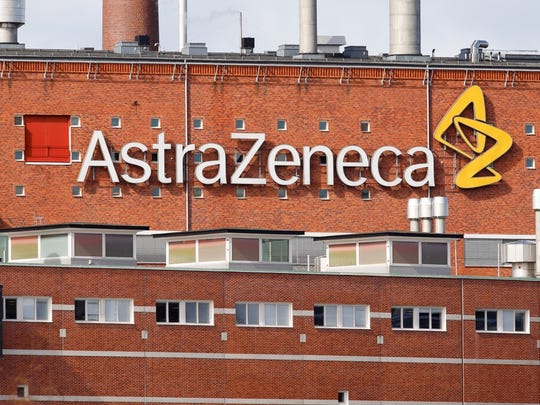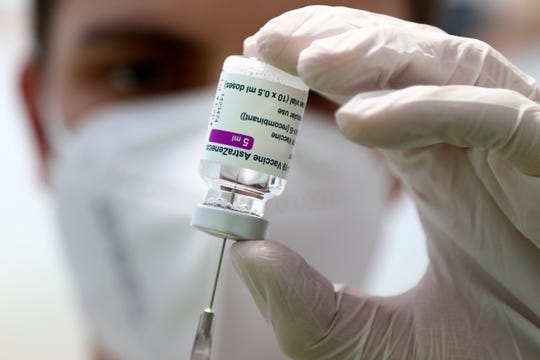COVID-19 vaccine from AstraZeneca-Oxford slightly less effective than first touted: 76% rather than 79% against disease, updated data shows
AstraZeneca released updated information on its COVID-19 clinical trial Wednesday evening, showing an effectiveness rate of 76% instead of the 79% rate it claimed earlier in the week.
On Monday, the company, which has developed its vaccine in collaboration with scientists at Oxford University, released interim data from a 32,000-person trial conducted this winter in the U.S., Chile and Peru.
But an independent review committee that examined the results said the data was misleading, because it contained information only through Feb. 17.
As of Feb. 17, 141 people in the trial had come down with COVID-19, the vast majority in the group that received a salt-water placebo rather than the active vaccine. Among those people, the vaccine was shown to 79% effective in preventing any symptoms of COVID-19 and 100% effective in preventing severe disease and hospitalizations.
The updated information, which included 190 symptomatic cases, showed only a slightly different picture.
The vaccine prevented 76% of cases of symptomatic disease two weeks after the second dose, as well as all severe disease and hospitalizations, according to the updated data. It was 85% effective against symptomatic COVID-19 in trial volunteers aged 65 and over, according to the new data, instead of the 80% reported earlier.
Eight trial participants developed severe COVID-19, all of whom received a saline shot instead of active vaccine, the company said.

A medical worker draws up a dose of the Oxford/AstraZeneca vaccine during the vaccination of priests in Kiev, Ukraine on March 16, 2021. (Photo: AFP via Getty Images)
Fourteen more cases of possible or probable infection have yet to be fully examined so the figures may change slightly, the company said.
The AstraZeneca-Oxford vaccine is not yet available in the United States, though the collaborators are expected to use their trial data to apply within a few weeks for the Food and Drug Administration’s authorization.
The updated figures show the vaccine remains effective enough to meet the FDA’s standards for effectiveness.
The trial also showed the vaccine to be very safe, despite concerns raised in Europe over about a dozen incidents of rare blood clots among the 20 million people vaccinated there. European and British drug regulators and the World Health Organization have determined the AstraZeneca-Oxford vaccine to be safe, though they could not completely rule out the possibility that the shot played a role in the unusual blood clots.

Pharmaceutical giant AstraZeneca, is a British company with its U.S. headquarters in Wilmington, Delaware. (Photo: Roland Magnusson / iStock Editorial via Getty Images)
Regulators will continue to follow vaccine recipients to make sure the blood clots are not a problem. There were none seen in the U.S. trial.
It is not clear why AstraZeneca presented dated information to the public, knowing it would have to provide the remaining figures a few weeks later, particularly because the findings were so similar.
Speaking Wednesday in a White House news conference, Dr. Anthony Fauci, the country’s top infectious disease doctor, was asked why the company put out the earlier figures.
He said AstraZeneca-Oxford disagreed with the independent review panel, officially called the Data and Safety Monitoring Board, about which figures should be released. The National Institutes of Health put out a news release copying the company’s numbers.
“On the basis of that, since we, ourselves — i.e. the federal government in the form of the NIH — had put out a press release that reflected almost exactly what the AZ had done, we then put out a very brief release which said that we urge strongly that AZ get back to the Data and Safety Monitoring Board to make sure that the data that is made public is accurately reflecting of what the actual data was. So that’s the entire story,” Fauci said.
At the same news conference, Andy Slavitt, White House senior advisor for COVID response, said the agency was simply trying to be transparent to help build public trust. The Food and Drug Administration authorization process that all vaccines must go through remains very rigorous, he said.
“So I would urge us not to focus on the process of the last couple of days,” Slavitt concluded, “but instead to focus on what really matters, which is what happens when these applications for these candidates are submitted to the FDA.”
Contact Karen Weintraub at [email protected]
Health and patient safety coverage at USA TODAY is made possible in part by a grant from the Masimo Foundation for Ethics, Innovation and Competition in Healthcare. The Masimo Foundation does not provide editorial input.

Medical staff prepares a syringe from a vial of the AstraZeneca coronavirus vaccine during preparations at the vaccine center in Ebersberg near Munich, Germany, Monday, March 22, 2021. (Photo: Matthias Schrader, AP)
Source: Read Full Article

